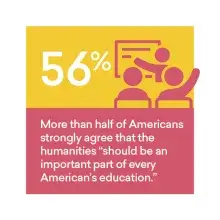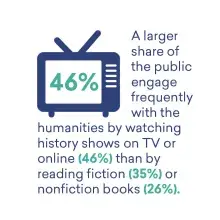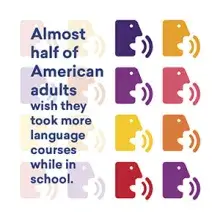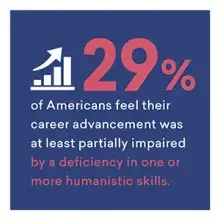In a new release today, the American Academy of Arts and Sciences reports on the first broad national survey on the humanities, which asked Americans about their engagement in a variety of humanistic activities, as well as their beliefs about the personal, societal, and economic benefits of the humanities. With funding from The Andrew W. Mellon Foundation, the survey was administered in fall 2019 to a nationally representative sample of 5,015 American adults (drawn from NORC at the University of Chicago’s AmeriSpeak panel). The findings indicate:
Attitudes about the Humanities
- 85% of Americans respond favorably to the term “humanities” after it has been defined for them.

- Although most Americans have a favorable view of the humanities generally, people are more enthusiastic about science and one of the humanities’ component disciplines, history.
- Around 90% of Americans believe the humanities help people understand others whose lives are different from their own.
- 86% of Americans agree that the humanities strengthen American democracy, and 73% agree that they make the economy stronger.
- While 22% of adults believe that the humanities are “not really for people like me,” more than half of adults believe the humanities attract people who are elitist and pretentious.
Engagement with the Humanities
- 97% of Americans occasionally engage in at least one form of humanities activity.

- Few people engage frequently in a broad range of humanities activities, or even in all the activities associated with a given discipline (e.g., someone who watches history shows is not very likely to also research history topics online).
- Black Americans are more engaged with the humanities than the general public, due principally to higher rates of religious text study, literary and poetry event attendance, and online sharing of humanities content.
The Humanities in Childhood and Education
- With the exception of reading, a majority of Americans do not remember seeing their parents often engaging in humanities activities.

- 53% of American adults recall seeing their parents read often, but only 36% recall frequently participating in reading activities with them.
- Almost 95% of Americans agree that the humanities should be an important part of every American’s education.
- College graduates are more likely to have been highly exposed to the humanities as children than people with only a high school education.
Humanities Skills in the Workplace
- 81% of Americans frequently use at least one humanities skill in their jobs.

- 57% of American workers often write to describe or explain something on their jobs (and another 20% do so sometimes).
- 9% of Americans often use a language other than English on their jobs.
- The youngest American adults (ages 18 to 29) are less likely than older Americans to use humanities skills at work.
The results of the study enlarge the framework for thinking about the meaning of the public humanities, shedding light on where and how the public engages with the humanities in their lives, what views they actually hold about the field, where and when they believe the humanities should be taught to young people, and finally, how Americans use humanities skills in the workplace, a topic that looms ever‐larger in conversations about humanities majors and the future of the field.
The findings included here only skim the surface of the results. Visit https://bit.ly/HumSurvey for both the detailed report on the survey findings and an “At a Glance” version with downloadable infographics that you are free to download and share.
The Indicators are supported through funding from the Andrew W. Mellon Foundation.
Contact: Robert B. Townsend
Phone: (571) 730-8517
E‐mail: rtownsend@amacad.org